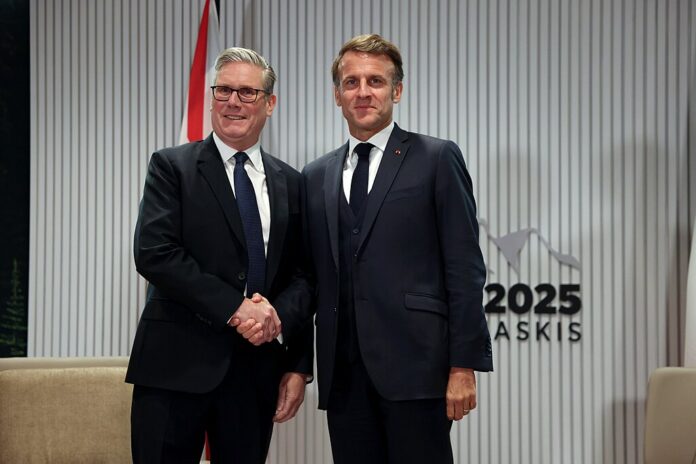UK and France strike harsh migrant plan, pledging tough new tactics to stop small boat crossings
Keir Starmer and Emmanuel Macron met in Downing Street for high-stakes talks that shifted sharply from diplomacy to deterrence. At the heart of the discussion: illegal migration and the soaring number of small boat crossings in the English Channel.
In a joint move, the British Prime Minister and French President pledged to go further than ever before. They confirmed that tackling irregular migration was a shared priority—one that now requires “shared solutions.”
Central to their conversation was a proposed “one in, one out” arrangement. Under the plan, the UK could return small boat migrants to France while accepting an equivalent number of asylum seekers already in Europe who have family links to Britain. Though the specifics remain under negotiation, both leaders agreed the concept could reshape how the Channel crisis is handled.
Speaking from inside No 10, Starmer described the meeting as “hugely symbolic,” reflecting not just a renewed diplomatic bond but “personal closeness” between the two governments. Macron, in turn, called the UK–France partnership a “gamechanger” for Europe and stressed the importance of unified action on border enforcement, security, and illegal migration.
A Downing Street spokesperson later confirmed that both leaders had discussed enhancing deterrents. One measure involves cracking down harder on illegal work in the UK, which officials say fuels false promises made by people smugglers. Starmer pointed to a recent surge in arrests for illegal working, aimed at eliminating the lure of jobs for those arriving via criminal routes.
Embed from Getty ImagesThe two leaders also agreed that stopping the gangs behind these crossings requires direct disruption. One tactic already in use—approved by the UK—is the French police slashing inflatable boats before they set off, a move described as harsh but effective.
Last week, the number of Channel crossings this year surpassed 20,000, triggering growing public pressure for action. Macron acknowledged the toll this has taken on both countries, calling illegal migration a “burden” that demands “humanity, solidarity and fairness.”
Starmer’s government has also backed stronger legislation at home. A new Borders Bill, already in force, gives police and law enforcement counter-terrorism-like powers to dismantle smuggling networks.
In the clearest sign yet that the UK intends to act quickly, the government cited recent cooperation with French authorities that led to 7,000 illegal working arrests, the seizure of 600 boats, and the conviction of nine people smugglers in Lille with sentences totalling 64 years.
Despite the progress, not everyone is convinced. Reform UK leader Nigel Farage told Parliament that Britain “must not be dictated to by an anti-Brexit French president” and called for an end to undocumented Channel arrivals altogether. Shadow Justice Secretary Robert Jenrick added that while a returns deal could help, the UK “deserves its own sovereign deterrent.”
Meanwhile, Macron and Starmer attended a joint reception at the British Museum, where the French president jokingly confirmed the loan of the historic Bayeux Tapestry to the UK. He credited King Charles for inspiring the agreement and praised the cultural and diplomatic thaw between the two nations.
But for now, all eyes remain on the outcome of Thursday’s Franco-British summit. Both leaders promised “concrete progress” on migration, signalling a serious shift from symbolic gestures to enforcement-first action.
